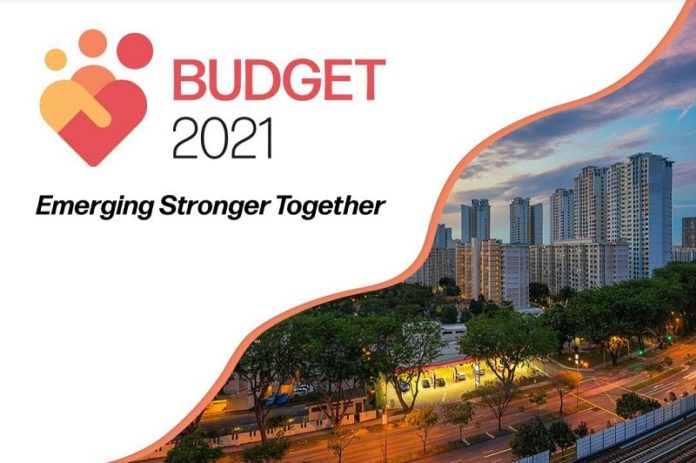The Budget statement for 2021 was delivered on Tuesday, 16th February 2021. It began with the Government mentioning how it committed nearly $100 billion last year through five Budgets to support Singaporeans and help businesses tide through difficult times.
Finance Minister Heng Swee Keat stated, “We faced the worst recession since our independence”, highlighting that “the pandemic-triggered recession has hit both demand and supply simultaneously”, with Singapore’s GDP contracting by 5.4% in 2020. He further stated that the overall budget deficit for Financial Year 2020 was the largest since Singapore’s independence at $64.9 billion, or 13.9% of GDP.
The Budget speech talked of re-opening the economy, shifting measures from containment to restructuring. The government’s growing concerns over long-term sustainability of debt and risks of inflation over time were attributed to two global phenomena – firstly, rising protectionism over supply chains, resources, data, and technology; and secondly, the unprecedented levels of public debt globally, due to the extraordinary fiscal responses during COVID-19.
The Budget document mentioned that the global economy is projected to recover to pre-COVID-19 levels this year. The Singapore economy is projected to grow between 4% and 6%, with some sectors growing well, and others remaining under stress. To address the immediate needs of the economy, the government will set aside $11 billion for a COVID-19 Resilience Package. This Package will have three prongs: to address immediate needs in public health and safe re-opening; to support workers and businesses; and to target support for sectors that are still under stress.
A focus on digitalisation
The Budget document mentioned that a total of $1 billion will be set aside to co-fund the digital transformation of all sizes of enterprises.
The Minister said that Singapore will continue to “seize the momentum brought about by COVID-19” and double down on its “efforts to accelerate the growth of new digital capabilities” for enterprises and workers to emerge stronger.
The plan consists of three initiatives:
a) Scale broad-based digitalisation by providing small and medium-sized enterprises (SMEs) access to relevant digitalisation resources and advisory. In the effort to digitalise, the Chief Technology Officer-as-a-Service (CTOaaS) has been launched to help SMEs uncover their digitalisation needs and transform their business operations. It consolidates existing digitalisation advisory services to provide a single touchpoint for both digital consultancy and project management services. SMEs will be able to tap on professional IT consultancies to receive end-to-end digital advice, from digital consultancy tailored to business needs, to downstream project implementation.
b) Develop digital leaders by building a local core of enterprises which are digital leaders that can compete regionally and globally. The Digital Leaders Programme (DLP) seeks to enable promising, high-potential local companies to become digital leaders by equipping them with digital capabilities and talent to transform their business models and capture new growth opportunities. The DLP will support companies to: i) Build technology leadership and expertise in the firm, including support for hiring of digital talent. ii) Develop and implement Digital Transformation Roadmaps, including support for consultancy and implementation costs.
c) Catalyse new products and business models by scaling and speeding up digital innovation to solve business challenges. The first aspect of this is the Enhanced Open Innovation Platform (OIP), and the second is the Emerging Technology Programme
The OIP was launched by IMDA in 2018 to support companies in getting quality and multi-disciplinary ideas, talent, and resources to meet their innovation and business needs effectively. ‘Problem owners’ such as sector lead agencies and Trade Associations and Chambers (TACs) identify problem statements, while ‘problem solvers’ comprising entrepreneurs, startups, companies, and technology innovators create innovative digital solutions to solve the problems. In the Fortitude Budget in May 2020, the Government introduced the National Innovation Challenges (NICs), riding on the success of the OIP. The NICs focus on partnerships to develop industry-led solutions to the challenges that all businesses are grappling with to emerge stronger from COVID-19.
In Budget 2021, the OIP will be enhanced to increase the scale and speed of digital innovation. It will also enable better matching, testing, and development through two new features: i) A Discovery Engine that facilitates the search and matching of technology solutions to challenges through automated recommendations; and ii) A Digital Bench that aids quicker Proof-of-Concept (POC) testing through a virtual POC sandbox and testing environment.
IMDA, through the OIP, works closely together with Enterprise Singapore and the National Research Foundation to drive adoption of solutions at scale. The improved matching process will allow more companies to effectively participate in co-innovation and digital transformation, fast-track the development of prototypes, and shorten the time taken for commercialisation.
To support commercialisation of innovations and diffusion of technology, the new Emerging Technology Programme will co-fund the costs of trials and adoption of frontier technologies like 5G, artificial intelligence, and trust technologies. This will continue helping SMEs and Large Local Enterprises sharpen their competitiveness.
Supporting businesses and workers
The Minister further mentioned how COVID-19 has been affecting workers and businesses, and commented on the various schemes that were introduced last year, like the Job Support Scheme, or JSS, which aims to protect jobs and help firms retain local workers. With the deterioration of the situation, the wage support level has been enhanced and i, the disbursement timeline extended.
The speech mentioned, “So far we have committed over $25 billion to the JSS, and supported over 150,000 employers for up to 17 months. The current tranche will continue to cover wages up to March 2021 for most sectors.”
The Budget mentioned that the speed of technological advances and re-configuration of global supply chains will reshape competitive advantages.
According to the budget speech, the pandemic has also heightened US-China technological rivalry, spurring on a global race for technological superiority. This has raised concerns over supply chain resilience. According to the Minister, the global supply chains have been reconfigured, and he said “we must plug ourselves into critical parts of global networks. Businesses will need to transform and digitalise, to plug into the flow of goods and capital.”
In the next three years, a fund of $24 billion will be allocated to “enable our firms and workers to emerge stronger. The efforts will span several years, but it is crucial that we start today. This builds on the momentum of the transformation push started five years ago, when we launched our Industry Transformation Maps.”
To support businesses, the Government will invest in three key platforms.
- Corporate Venture Launchpad, which will be piloted this year to drive new innovative ventures. This Launchpad will provide co-funding for corporates to build new ventures through pre-qualified venture studios.
- The Open Innovation Platform, or OIP. The OIP (with Cloud-based Digital Bench for accelerated virtual prototyping and testing) facilitates the matching of problems faced by companies and public agencies, with solution providers, and co-funds prototyping and deployment.
- The Global Innovation Alliance, or GIA, which serves to catalyse cross-border collaboration between Singapore and major innovation hubs globally.
Establishing relationships globally and within Southeast Asia
The Budget mentioned that strong connectivity enables businesses to plug into global and regional supply chains and industry clusters, and deepen innovation partnerships It cited a number of collaborations with other ASEAN nations, such as the joint venture between Singapore’s Sembcorp and Indonesia’s PT Jababeka to boost food processing, building materials, and medical equipment manufacturing.. Also, it noted that the Singapore Business Federation will officially be opening new overseas offices soon in Jakarta and Ho Chi Minh City.
The Budget also announced that a new cluster of industries around electronics, medtech, food manufacturing and processing sectors is to be built up soon. “The recently launched Southeast Asia Manufacturing Alliance will support these efforts. It serves to promote a network of industrial parks to manufacturers interested in investing in both Singapore and the region, and connect local firms with these manufacturers”, the speech said. It further mentioned that Singapore is already working with Indonesian partners to build the Nongsa Digital Park to facilitate collaboration between Singaporean companies and tech talent in Indonesia.
Being technologically inclusive
One key target for technological transformation is the agricultural sector, which will see an Agri-Food Cluster Transformation Fund worth $60 million replace the existing Agriculture Productivity Fund.
In addition to agriculture, the government will also focus on clean energy, starting with promoting the use of Electric Vehicles. The Minister said, “Technology is also changing the future of transport. While we are going car-lite, we can further reduce emissions by switching to cleaner-energy vehicles. Electric Vehicles, or EVs, is the most promising clean-energy vehicle technology today. Last year, I announced the expansion of Singapore’s public charging infrastructure for EVs. We will accelerate the development of our charging infrastructure to better support the growth of EVs in the next decade. We aim to deploy 60,000 charging points at public car parks and private premises by 2030 – more ambitious than our previous target of 28,000.”
To this end, a fund of around $30 million willould be dedicated to EVs for the next five years. To further promote a green economy, an Enterprise Sustainability Programme will also be launched to “help enterprises, especially SMEs, use resources more efficiently and develop new green products and solutions.”
The Minister highlighted the need to adapt to new ways for working, brought about by COVID-19. He said, “The employment landscape is undergoing fundamental changes, and COVID-19 will accelerate these changes, by building a digital, innovation-driven economy means that businesses will need highly-skilled workers and deep talent.”
















